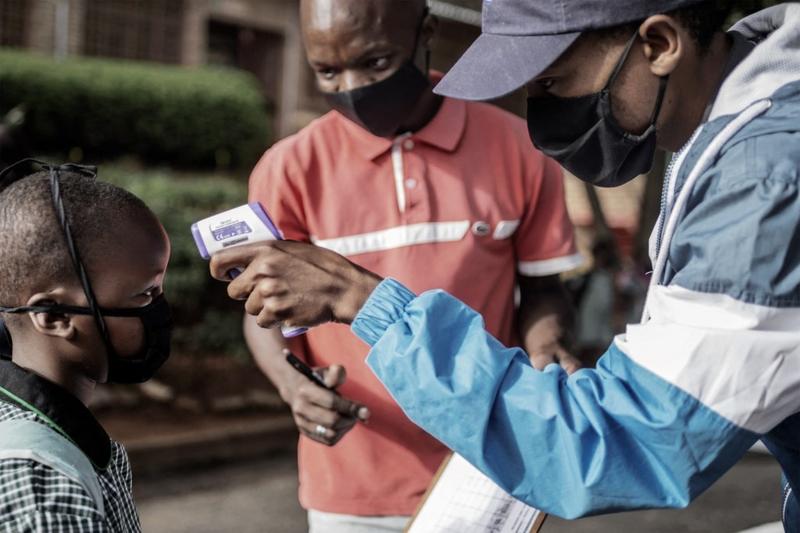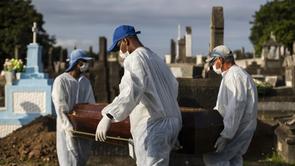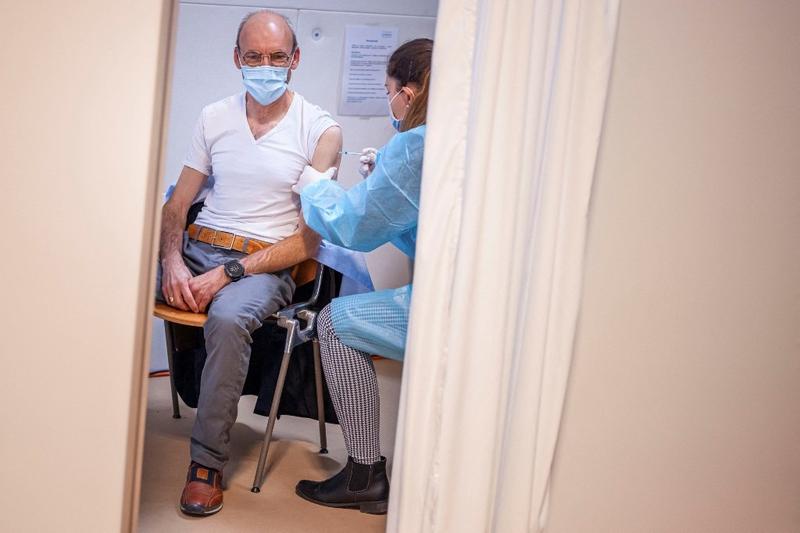 A student from Ithute Higher Primary School is screened, during the first day of the new academic year by school staff, in Alexandra, Johannesburg, on February 15, 2021. (LUCA SOLA / AFP)
A student from Ithute Higher Primary School is screened, during the first day of the new academic year by school staff, in Alexandra, Johannesburg, on February 15, 2021. (LUCA SOLA / AFP)
SAO PAULO / HAVANA / TUNIS / MOSCOW / ADDIS ABABA / WINDHOEK / ACCRA / LONDON / ROME / LIMA / QUITO / BUENOS AIRES / MEXICO CITY / BOGOTA / ZURICH - The number of confirmed COVID-19 cases in Africa reached 5,185,617 as of Sunday noon, the Africa Centers for Disease Control and Prevention (Africa CDC) said.
The Africa CDC, the specialized healthcare agency of the African Union, said the death toll from the pandemic stood at 137,253 while 4,607,454 patients across the continent had recovered from the disease.
South Africa, Morocco, Tunisia, Ethiopia and Egypt are among the countries with the most cases in the continent, according to the Africa CDC.
In terms of the caseload, southern Africa is the most affected region, followed by the northern and eastern parts of the continent, while central Africa is the least affected region in the continent, according to the Africa CDC.
Peru
Peru has extended the suspension of commercial flights from South Africa, Brazil and India until July 11 to prevent the spread of COVID-19, the government announced Saturday.
The measure, published in the official newspaper "El Peruano," was adopted after the second case of the Delta variant of COVID-19 was discovered in the country.
The government, which initially adopted the measure on May 10, also ordered that Peruvians coming from or through those countries be subjected to a 14-day quarantine in their homes.
The Ministry of Health reported this month two COVID-19 cases of the Delta variant in the Peruvian region of Arequipa, which forced the government to declare an "extreme alert" to avoid infections.
Russia
Russia reported 17,611 new COVID-19 cases on Sunday, including 8,305 in Moscow, taking the official national tally since the pandemic began to 5,316,826.
The government coronavirus task force said 450 people had died of coronavirus-linked causes in the past 24 hours, pushing the national death toll to 129,361.
The federal statistics agency has kept a separate count and has said Russia recorded around 270,000 deaths related to COVID-19 from April 2020 to April 2021.
Global tally
Coronavirus cases worldwide surpassed 178.20 million while the global death toll topped 3.86 million, according to data compiled by Johns Hopkins University.
Cuba
Cuba’s Soberana 2 vaccine candidate has shown 62 percent efficacy with just two of its three doses, state-run biopharmaceutical corporation BioCubaFarma said on Saturday, citing preliminary data from late phase trials.
Cuba, which has a decades-old reputed biotech sector, has five vaccine candidates in clinical trials, of which two - Soberana 2 and Abdala - are in late phase trials.
Tunisia
Tunisian Prime Minister Hichem Mechichi decided on Saturday to impose general lockdown in the north-central governorate of Kairouan, following the deterioration of the COVID-19 pandemic in the region.
According to a statement released by the government, the general lockdown shall be imposed if the infection rate of a governorate reaches 400 cases out of every 100,000 inhabitants, effective from Sunday.
"Regional quarantine centers will be created to accommodate positive cases and field hospitals will be set up for the management of cases, with the supply of oxygen and the organization of screening campaigns taken into account," the government statement said.
Laboratories will also be strengthened to help identify the COVID-19 variant in Kairouan, it added.
Tunisian Health Ministry on Saturday reported 2,193 new COVID-19 cases, raising the total number of infections in the North African country to 381,175.
The death toll from the virus rose by 86 to 13,960, according to a ministry statement.
Namibia
The Ministry of Health and Social Services in Namibia have expressed a great concern over the surge in COVID-19 cases and deaths, urging the nation to get vaccinated as the country is being hit hard by a third wave.
Minister of Health and Social Services Kalumbi Shangula on Saturday lauded the increasing number of people taking up vaccination to fight the surging COVID-19 numbers, saying this showed growing confidence in vaccination as a sure way of preserving life.
Shangula, however, raised concern over the high number of Namibians who are dying from COVID-19 without being vaccinated despite the country reaching 101,933 inoculations.
As of Saturday, the country's daily COVID-19 update recorded 1,649 newly confirmed cases which sets the positivity ration at 36 percent. Namibia now has 71,761 cases recorded and 1,134 deaths.
West Africa
Facing a global shortage of the COVID-19 vaccines supply, Chairman of the Economic Community of West African States (ECOWAS) Nana Addo Dankwa Akufo-Addo on Saturday urged West African countries to continue the production of the vaccines.
Akufo-Addo, also the Ghanaian president, said at the opening of the 59th Ordinary Session of the Heads of State of the subregional bloc that the issue of COVID-19 was a major headache for the leaders of West Africa.
Moreover, he added that although the initial supply of the COVAX AstraZeneca vaccines had supported subregional efforts to suppress the spread of the virus, "the quantities received were woefully inadequate."
"We must, thus, continue to work on the purchase and production of vaccines in our region. We must encourage Ghana, Nigeria, and Senegal which are making the effort to produce vaccines locally. We cannot afford to be naked the next time," said Akufo-Addo.
ALSO READ: WHO: New virus variant of interest identified in 29 countries
 Cemetery workers carry the coffin that contains the remains of a person, who died from COVID-19 related complications, at the Inhauma cemetery in Rio de Janeiro, Brazil, Friday, June 18, 2021. (BRUNA PRADO / AP)
Cemetery workers carry the coffin that contains the remains of a person, who died from COVID-19 related complications, at the Inhauma cemetery in Rio de Janeiro, Brazil, Friday, June 18, 2021. (BRUNA PRADO / AP)
Brazil
Brazil’s death toll from COVID-19 surpassed 500,000 on Saturday as experts warn that the world’s second-deadliest outbreak may worsen due to delayed vaccinations and the government’s refusal to back social distancing measures.
Only 11 percent of Brazilians have been fully vaccinated and epidemiologists warn that, with winter arriving in the southern hemisphere and new variants of the coronavirus circulating, deaths will continue to mount even if immunizations gain steam.
Brazil has registered 500,800 deaths from 17,883,750 confirmed COVID-19 cases, according to Health Ministry data on Saturday, the worst official death toll outside the United States. Over the past week, Brazil has averaged 2,000 deaths per day.
Experts see the toll in Brazil, already the highest in Latin America, climbing far higher.
On Saturday, thousands took to the streets across Brazil to protest against President Jair Bolsonaro's pandemic response, blasting the leader for not acquiring vaccines fast enough and for questioning the need for mask-wearing.
The government faces fierce criticism for passing up early opportunities to buy vaccines. Pharmaceutical maker Pfizer said it got no response to offers to sell vaccines to the government between August and November last year.
United Kingdom
Britain reported more than 10,000 coronavirus cases for a third consecutive day on Saturday as there has been a 79 percent rise in the highly contagious Delta variant in the country in the past week.
Britain has reported another 10,321 coronavirus cases in the latest 24-hour period, bringing the total number of coronavirus cases in the country to 4,620,968, according to official figures released Saturday.
The country also recorded another 14 coronavirus-related death. The total number of coronavirus-related deaths in Britain now stands at 127,970. These figures only include the deaths of people who died within 28 days of their first positive test.
Italy
Italian Health Minister Roberto Speranza on Saturday signed a new ordinance, extending the white or lowest-risk pandemic zone to most of Italy.
"The new ordinance will become effective on Monday June 21," the minister said.
The regions of Basilicata, Calabria, Campania, Marche, Sicily, Tuscany and the Autonomous Province of Bolzano will join Abruzzo, Emilia Romagna, Friuli Venezia Giulia, Lazio, Liguria, Lombardy, Marche, Molise, Piedmont, the Autonomous Province of Trento, Puglia, Sardinia, Umbria and Veneto in the white zone, where most anti-virus restrictions are lifted.
The only remaining anti-virus regulations in the white zone are social distancing and the obligation to wear a mask both indoors and outdoors.
In a bid to contain the second wave of the pandemic, Italy has been using a color-coded system for COVID-19 situation in different regions in the country since late last year - white for almost zero risk, yellow for low risk, orange for medium risk, and red for high risk - with varying restrictions according to the level of virus transmission.
ALSO READ: Virus: EU lifts entry restrictions for US travelers and others
Ecuador
Ecuador registered 1,191 new cases and 45 more deaths from COVID-19, bringing the number of total cases to 445,586 and deaths to 15,695, the Ministry of Public Health reported Saturday.
In its daily report, the ministry also reported another 5,589 deaths considered to be COVID-19 related, but not verified.
For the second consecutive day, the province of Guayas led the country in the number of new cases, with 535 infections, most of them registered in the provincial capital of Guayaquil.
Argentina
Argentina on Saturday reported 15,631 new COVID-19 infections and 495 more deaths from the disease, raising the total caseload to 4,258,394 and the national death toll to 88,742.
According to the Ministry of Health, 7,386 patients are currently hospitalized, with intensive care unit bed occupancy reaching 74.6 percent nationwide.
Mexico
Mexico City schools that had just gone back to in-person classes will be closed again starting Monday as the sprawling capital climbs into a higher tier of coronavirus risk, education authorities said on Saturday.
Mexico City officials had loosened restrictions on gatherings in schools, hotels, stores and restaurants just two weeks ago as the dense urban zone moved into the lowest risk tier of the government's four-level "traffic light" model.
But the federal Health Ministry on Friday evening put Mexico City, home to more than 9 million people, a step higher on the scale for June 21 to July 4.
Mexico City Mayor Claudia Sheinbaum said the city's Epidemiological Traffic Light, a calculation of risk factors, has climbed to nine points from eight points, putting the capital into the more restrictive tier.
The health ministry on Saturday reported 3,964 new confirmed cases of COVID-19 in the country and 192 more fatalities, bringing the total figures to 2,475,705 infections and 231,151 deaths.
The government has said the real number of cases is likely significantly higher, and separate data published in March suggested the actual death toll is at least 60 percent above the confirmed figure.
European Union
The European Union on Friday lost its bid to speed up deliveries of AstraZeneca’s COVID-19 vaccines, the first of its legal challenges against the drugmaker that rocked the bloc as it scrambled to shore up supplies.
AstraZeneca said the EU had lost its legal case, but European Commission President Ursula von der Leyen said the court ruling supported its view that the Anglo-Swedish pharmaceutical giant had failed to honour its commitments.
The row plunged the EU into crisis earlier this year as states, under pressure to speed up vaccinations, scrambled for shots. Brussels has since largely cut ties with AstraZeneca, choosing not to buy any more of its vaccines for now.
The drugmaker had committed to do its best to deliver 300 million doses to the 27-nation bloc by the end of June, but production delays led it to revise this to 100 million vaccines.
This delayed the EU's vaccination drive as the bloc had initially bet on AstraZeneca to deliver the largest volume, sparking a bitter row and EU legal action to get at least 120 million doses by the end of June.
However, the judge ruled that AstraZeneca must deliver only 80.2 million doses by a deadline of Sept. 27. The drugmaker said it would "substantially exceed" that by the end of June.
The court said in a statement that AstraZeneca must deliver 15 million doses by July 26, another 20 million by Aug. 23 and a further 15 million by Sept 27, to reach a total of 50 million doses, which are in addition to 30 million that had been given to the EU when the legal case began.
Ethiopia
Ethiopia registered 137 new COVID-19 cases in the past 24 hours, taking the nationwide tally to 275,036 as of Saturday evening, according to the country's Ministry of Health.
The ministry said four new deaths and 662 more recoveries were reported, bringing the national death toll to 4,280 and total recoveries to 254,296.
Colombia
Colombia reported 589 new deaths from COVID-19 in the past 24 hours, raising the national death toll to 99,335, the country's ministry of health and social protection said Saturday.
The ministry added that 28,734 new infections were reported, bringing the national tally to 3,917,348.
Mauritius
Mauritius has vaccines available to cater to 42 percent of the population, Laurent Musango, the World Health Organization representative in the country, said. The Indian Ocean island nation is set to reopen borders in phases starting July 15.
As of June 14, 413,473 people have received the first shot, or 32.7 percent of the population, while 219,084 people are fully vaccinated, Musango said in a statement on WHO Africa’s website.
 A patient receives a dose of Moderna vaccine against COVID-19 at a newly-opened vaccination center in Lausanne, Switzerland, on April 19, 2021. (VALENTIN FLAURAUD / AFP)
A patient receives a dose of Moderna vaccine against COVID-19 at a newly-opened vaccination center in Lausanne, Switzerland, on April 19, 2021. (VALENTIN FLAURAUD / AFP)
Switzerland
Switzerland plans to allow 12- to 15-year olds to receive vaccinations against COVID-19 as soon as next week, government vaccine chief Christoph Berger told Swiss newspaper NZZ in an interview published on Sunday.
"Young people who want to be vaccinated should be given the opportunity," Berger told NZZ, adding the government's approval was expected to be communicated next week.
"For those with pre-existing conditions or those in contact with immunocompromised individuals who are at risk, vaccination makes sense," he said, adding that - unlike for older populations - it would not be necessary to target a vaccination rate for the 12- to 15-year old population.
Switzerland on June 4 approved vaccinating 12-to-15-year-old children with the COVID-19 shot from Pfizer and BioNTech , ahead of the country's plan to start inoculating younger people starting as early as July.
Moderna , whose shot has been approved for adults in the country, has also submitted a request for its vaccine to be approved for 12- to 17-year-olds, currently under review with drugs regulator Swissmedic.


